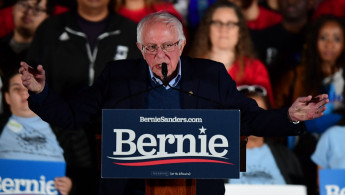Sanders cements Democrat front-runner status after Nevada caucuses victory
Joe Biden was a distant second, followed by Pete Buttigieg in third and Elizabeth Warren in fourth, with Amy Klobuchar and Tom Steyer in a close race for fifth. They all are pledging to stay in the race as the primary moves on to South Carolina this coming Saturday, with the Super Tuesday states voting on March 3.
Nevada's caucuses on Saturday were the first chance for White House hopefuls to demonstrate appeal to a diverse group of voters in a state far more representative of the country as a whole than Iowa and New Hampshire. Sanders, a 78-year Vermont senator and self-described democratic socialist, won by rallying his fiercely loyal base and tapping into support from Nevada’s large Latino community.
In a show of confidence, Sanders left Nevada on Saturday for Texas, which offers one of the biggest delegate troves in just 10 days on Super Tuesday.
“We are bringing our people together," he declared. “In Nevada we have just brought together a multigenerational, multiracial coalition which is not only going to win in Nevada, it’s going to sweep this country.”
Saturday's win built on Sanders’ victory earlier this month in the New Hampshire primary. He essentially tied for first place in the Iowa caucuses with Buttigieg, the former mayor of South Bend, Indiana, who has sought to position himself as an ideological counter to Sanders’ unabashedly progressive politics.
But for all the energy and attention devoted to the first three states, they award only a tiny fraction of the delegates needed to capture the nomination. After South Carolina, the contest becomes national in scope, putting a premium on candidates who have the resources to compete in states as large as California and Texas.
Too extreme to win?
While Sanders' victory in Nevada encouraged his supporters, it only deepened concern among establishment-minded Democratic leaders who fear he is too extreme to defeat Trump. Sanders for decades has been calling for transformative policies to address inequities in politics and the economy, none bigger than his signature “Medicare for All” health care plan that would replace the private insurance system with a government-run universal program.
|
||
Trump gloated on social media, continuing his weeks-long push to sow discord between Sanders and his Democratic rivals.
“Looks like Crazy Bernie is doing well in the Great State of Nevada. Biden & the rest look weak,” Trump tweeted. “Congratulations Bernie, & don’t let them take it away from you!”
Buttigieg congratulated Sanders, too, but then launched an aggressive verbal assault on the senator as too divisive.
“Before we rush to nominate Senator Sanders in our one shot to take on this president, let’s take a sober look at what is at stake for our party, for our values and for those with so much to lose," he said. “Senator Sanders believes in an inflexible, ideological revolution that leaves out most Democrats, not to mention most Americans.”
Campaigning continues
For Biden, a second place finish in Nevada could be the lifeline he needed to convince skeptics he still has a path to the nomination as the primary moves to more diverse states. He took aim at Sanders and billionaire Mike Bloomberg, who wasn't on the Nevada ballot, but has emerged as a threat to Biden in contests that begin next month.
"I ain’t a socialist. I’m not a plutocrat. I’m a Democrat,” Biden declared.
Warren, who desperately needed a spark to revive her stalled bid, ignored Sanders and instead took a shot at Bloomberg's height as she thanked Nevada “for keeping me in the fight.”
Rallying supporters in Seattle, she said she wanted to talk about “a big threat — not a tall one, but a big one: Michael Bloomberg.”
Also still in the fight: Billionaire Steyer, who spent more than $12 million on Nevada television and Minnesota Sen. Klobuchar, who hoped to prove her strong New Hampshire finish was no fluke.
Klobuchar, campaigning in her home state of Minnesota Saturday night, claimed Nevada success no matter her poor showing.
In-depth: The 2020 Muslim vote: Are there any cultural divides among American Muslim voters?
“As usual I think we have exceeded expectations,” she said.
The first presidential contest in the West tested the candidates' strength with black and Latino voters for the first time in 2020. Nevada’s population aligns more with the US as a whole, compared with Iowa and New Hampshire: 29 percent Latino, 10 percent black and 9 percent Asian American and Pacific Islander.
Bloomberg, the former New York mayor who dominated the political conversation this week after a poor debate-stage debut, wasn't on the ballot. He's betting everything on a series of delegate-rich states that begin voting next month.
The stakes were high for Nevada Democrats to avoid a repeat of the chaos in the still-unresolved Iowa caucuses, and it appeared Saturday’s contest was largely successful.
Unlike state primaries and the November election, which are run by government officials, caucuses are overseen by state parties.





 Follow the Middle East's top stories in English at The New Arab on Google News
Follow the Middle East's top stories in English at The New Arab on Google News
![The UAE is widely suspected of arming the RSF militia [Getty]](/sites/default/files/styles/image_330x185/public/2024-11/GettyImages-472529908.jpg?h=69f2b9d0&itok=Yauw3YTG)
![Netanyahu furiously denounced the ICC [Getty]](/sites/default/files/styles/image_330x185/public/2024-11/GettyImages-2169352575.jpg?h=199d8c1f&itok=-vRiruf5)
![Both Hamas and the Palestinian Authority welcomed the ICC arrest warrants [Getty]](/sites/default/files/styles/image_330x185/public/2024-11/GettyImages-2178351173.jpg?h=199d8c1f&itok=TV858iVg)